Chaplains in Legal or Court Settings: Growing Roles
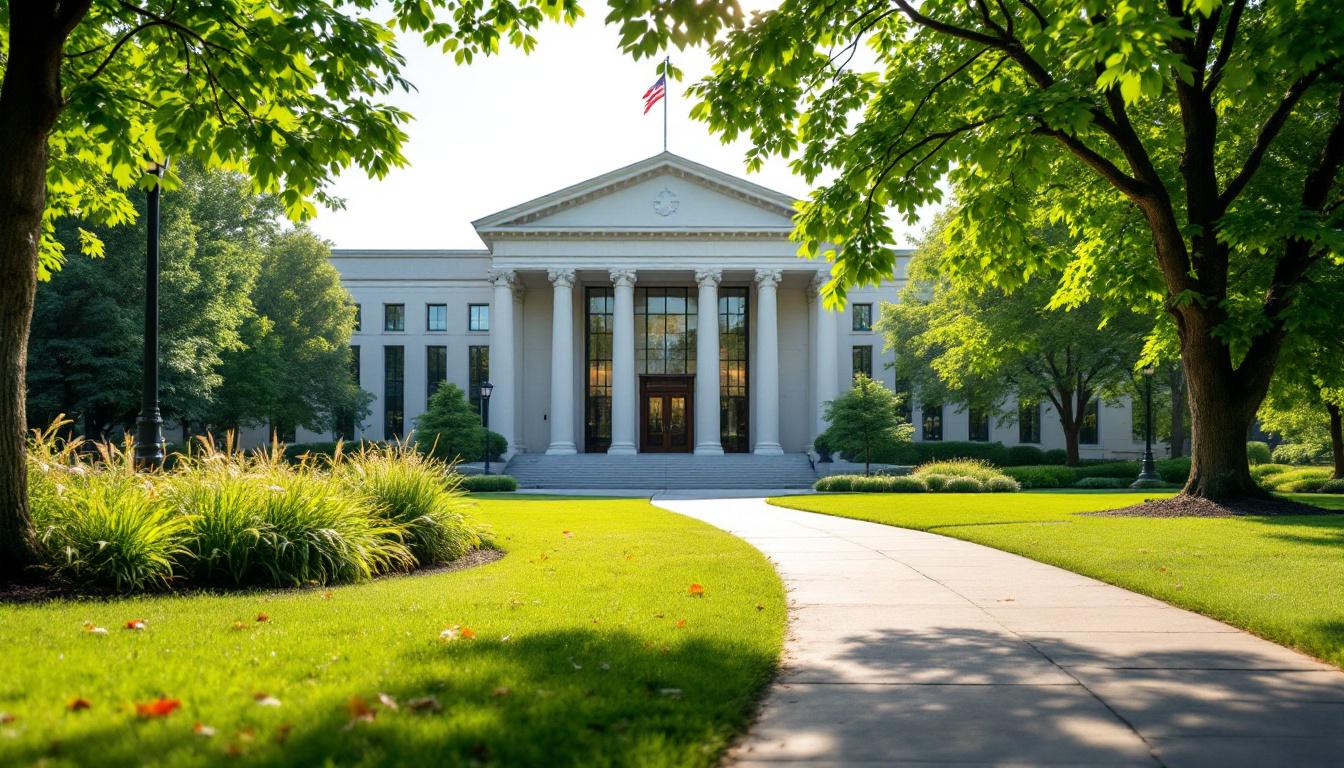

The role of chaplains has traditionally been confined to religious institutions and community outreach. However, over recent decades, their functions have significantly expanded into legal and judicial environments, reflecting societal shifts toward inclusive spiritual care. This article explores the evolving landscape of chaplaincy in legal, correctional, and public institutions, highlighting their diverse responsibilities, the legal and ethical frameworks guiding their work, qualifications, and broader societal relevance.
The field of chaplaincy is undergoing significant change, expanding beyond its traditional religious framework into a more inclusive and versatile profession. Historically centered around specific faiths, chaplains now serve individuals across a spectrum of spiritual and secular beliefs, including those with no religious affiliation. This shift is reflected in the diversity of environments where chaplains work, such as hospitals, correctional facilities, military bases, universities, and even environmental and social justice organizations.
The modern chaplain's role has grown from solely providing religious services to encompassing emotional support, crisis intervention, and holistic care that addresses psychological, spiritual, and social needs. Many chaplains now possess clinical training in areas like substance abuse counseling, trauma recovery, and mental health support. This transition helps meet the evolving needs of the populations they serve.
Training programs for chaplains are adapting to these changes, emphasizing interdisciplinary skills, cultural competence, and the ability to serve diverse communities. Certification bodies increasingly recognize non-traditional backgrounds, including secular and humanist perspectives, underlining the profession’s broadening scope.
Today, chaplains are integral to community resilience and individual well-being. Their societal relevance is especially evident in healthcare, where spiritual care has been shown to improve patient outcomes, satisfaction, and even reduce healthcare costs.
In correctional settings, chaplains provide essential support for inmates' religious needs, mental health, and efforts to reduce recidivism through spiritual and personal development programs. Their presence in disaster response and crisis situations offers reassurance, emotional stabilization, and support for families, victims, and first responders.
Chaplains also foster community-police relations by organizing events, facilitating dialogues, and providing ceremonies, helping build trust between law enforcement and communities. As public institutions increasingly recognize the importance of mental health and spiritual well-being, chaplains contribute significantly to holistic approaches in these sectors.
Overall, as society faces complex challenges—ranging from health crises to social justice issues—the role of chaplains grows in importance. They serve as bridges between individuals and community resources, promoting resilience, understanding, and peace.
AspectTraditional RoleEvolving FunctionBroader ImpactSettingsChurches, ParishesHospitals, correctional facilities, military, educational institutionsEnhances holistic wellbeing across sectorsFocusReligious servicesSpiritual, psychological, social supportAddresses diverse societal needsTrainingTheological and pastoralInterdisciplinary, clinical, cultural competencePrepares for complex and varied rolesCommunity EngagementFaith-based outreachPublic health, social justice, interfaith initiativesPromotes societal resilience
This progression highlights how chaplains continue to adapt and remain relevant, playing a vital role in addressing contemporary societal challenges with compassion, inclusivity, and expertise.
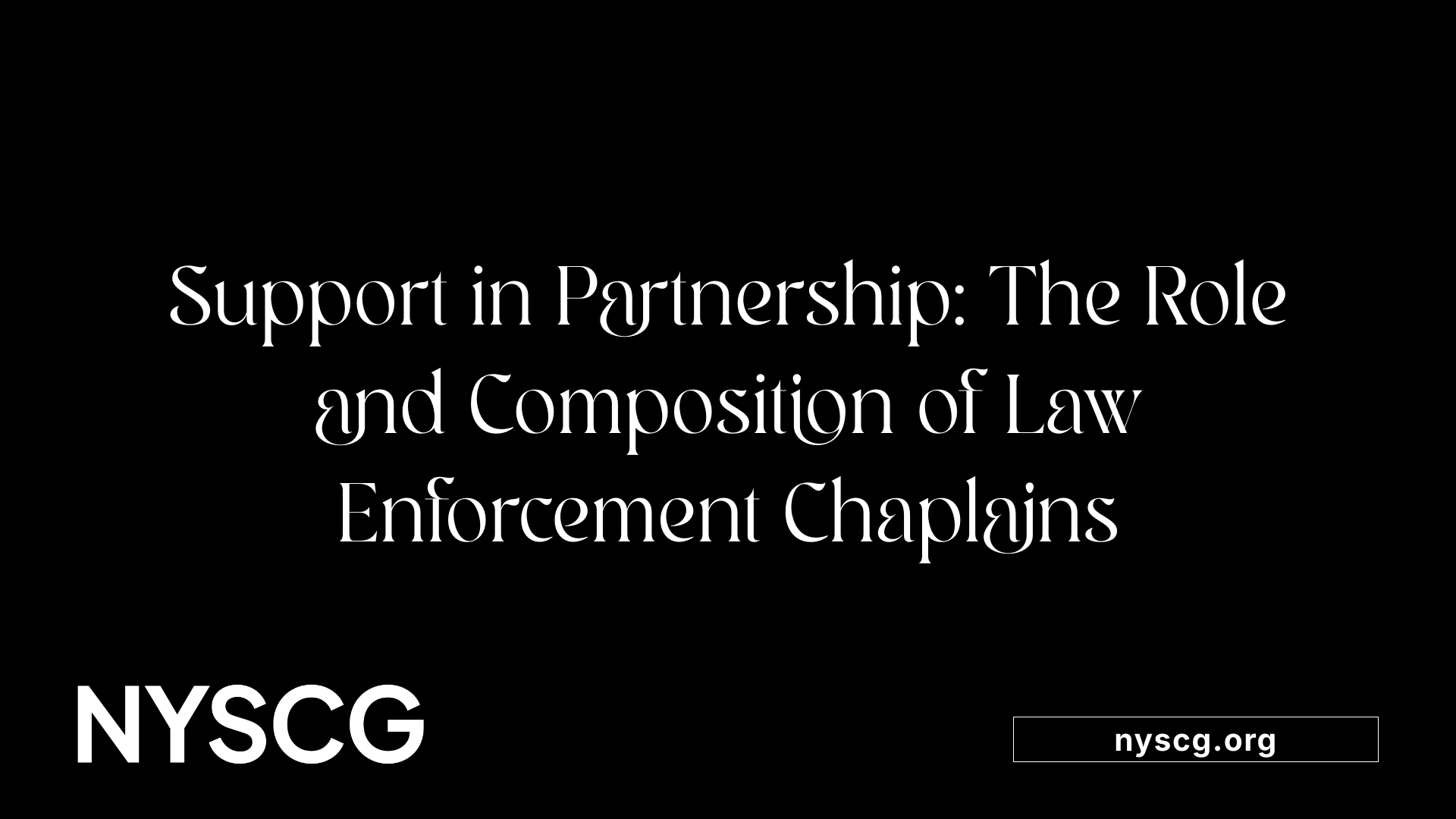
Police chaplains are generally not sworn law enforcement officers. Instead, they serve as support and advisory personnel within police departments, often working alongside officers in a voluntary or staff capacity.
Most police chaplains are laypersons who are endorsed by religious or faith-based organizations. They usually bring active or retired ministry experience, which qualifies them to offer spiritual guidance, moral support, and crisis intervention.
In terms of training, police chaplains often complete specialized education in pastoral care and crisis management. Many participate in training programs offered by organizations such as the International Conference of Police Chaplains (ICPC) to learn how they can support officers, victims, and community members effectively.
While some may wear uniforms or equipment similar to police officers, they do not have arrest powers or perform traditional law enforcement duties. Their main role is to provide emotional and spiritual assistance during crises, including accidents, tragedies, and community disturbances.
The qualifications for becoming a law enforcement chaplain include endorsement by a recognized religious body, credentials in ministry, and successful background checks. An essential aspect is the completion of training that equips them to handle sensitive situations involving trauma, death notifications, and moral issues.
Overall, law enforcement chaplains contribute in areas like community engagement, crisis response, and officer well-being, functioning as trusted confidants rather than official police officers.
AspectTypical ProfileAdditional DetailsRoleSupport and advisoryFocus on spiritual and emotional careStatusUsually non-swornOften volunteers or department staffEndorsementReligious organization endorsedCrucial for legitimacyTrainingPastoral care, crisis interventionSome trained via ICPC or similar bodiesDutiesCrisis support, community relationsNo active law enforcement functions
This structure allows police chaplains to provide vital support services without the responsibilities or authorities of sworn officers, focusing entirely on the well-being of individuals and the community.
Chaplains working in legal, court, or law enforcement environments generally start with a strong foundation in spiritual or religious leadership. The majority hold ordination, licensing, or endorsement from recognized religious bodies and often possess advanced degrees such as a Master of Divinity or equivalent from accredited seminaries.
Their training includes specialized courses on topics such as crisis intervention, ethics, confidentiality, and department-specific procedures. These courses often include FEMA's incident management and emergency response training, preparing chaplains for high-pressure situations.
Certification levels vary based on experience and specialization. Entry-level or basic certification typically requires completing core courses like ethics, death notification protocols, and law enforcement chaplaincy principles. More experienced chaplains seeking advanced certification might participate in additional training focused on death investigations, line-of-duty death support, and critical incident stress management.
Practical experience plays a vital role. Many chaplains have backgrounds as active or retired clergy, with extensive experience in pastoral care, counseling, and community outreach. This experience ensures they can provide meaningful support during sensitive situations.
Career progression often involves advancing through certification tiers, gaining hands-on experience within law enforcement agencies, and engaging in continuous education. Active participation in professional development, emergency response drills, and specialized training enhances a chaplain’s effectiveness and opportunities for advancement.
Overall, the pathway combines formal education, specialized training, and practical experience, enabling chaplains to serve effectively in diverse legal and law enforcement contexts.
Qualification/Training AspectTypical RequirementAdditional DetailsEducational BackgroundMaster’s degree in theology, psychology, or related fieldProvided by accredited seminaries or universitiesReligious EndorsementEndorsed by a recognized faith groupNecessary for legal protection and professional credibilityCertification LevelBasic and advanced certificationsObtained through boards like the Association of Professional ChaplainsSpecialized CoursesCrisis intervention, death notification, law enforcement protocolsIncludes FEMA incident management, active shooter responsePractical ExperiencePastoral care, law enforcement supportActive or retired clergy, community engagementContinuing EducationRegular training updatesEnsures familiarity with current procedures and best practices
This comprehensive pathway ensures that law enforcement chaplains are well-equipped, ethically grounded, and prepared for the unique demands of their roles.
Chaplains serve as vital support figures within law enforcement agencies, correctional facilities, and the broader criminal justice system. Their main responsibilities encompass providing emotional, spiritual, and psychological aid to officers, victims, families, and inmates in times of need.
In critical incidents such as line-of-duty deaths, accidents, or violence, chaplains step in quickly to deliver necessary support. They assist with death notifications, ensuring that families and officers receive respectful and compassionate communication.
Within correctional facilities, chaplains help inmates address their religious and spiritual needs. They facilitate religious services, offer counseling, and support psychological adjustment. Their presence helps inmates explore faith, reduce recidivism, and prepare for reentry into society.
Chaplains also play a significant role in community engagement. They organize events, participate in funerals, and establish partnerships with leaders and organizations to foster trust and improve relations between law enforcement and the public.
During crises, such as mass incidents or public unrest, chaplains help manage emotional responses, support victims and their families, and assist officers and community groups in maintaining calm and order.
Furthermore, chaplains support officer well-being by offering confidential spiritual and mental health counseling. They help officers cope with stress, trauma, and moral injuries, which are common in law enforcement professions.
A crucial aspect of their role is maintaining confidentiality, protected by law since the 1960s, akin to attorney-client privilege. This legal protection encourages officers and individuals to seek support without fear of exposure.
In summary, chaplains in law enforcement and legal contexts uphold the moral, emotional, and spiritual resilience of all parties involved. By providing crisis response, inmate support, community engagement, and confidential aid, they enhance the effectiveness and humanity of the justice system.
Chaplains working in public institutions such as law enforcement agencies, correctional facilities, hospitals, and schools must navigate a complex landscape of legal and ethical responsibilities.
One of the foremost concerns is confidentiality. Military and healthcare chaplains, for example, benefit from legal privileges similar to attorney-client privilege, which protect sensitive communications from disclosure. This confidentiality encourages individuals to speak freely about personal, emotional, or spiritual issues without fear of exposure or repercussions.
However, this privilege has limits. Many states require mandatory reporting of child abuse, which can conflict with the absolute confidentiality typically maintained by chaplains. For instance, if a service member confesses to abusing a child to a military chaplain, the jurisdictional conflict between the chaplain’s confidentiality privilege and state laws regarding child protection may arise.
Another critical consideration is religious neutrality. Since many public institutions serve diverse populations, chaplains must avoid proselytizing or endorsing specific religious beliefs. Their role is to provide support that respects individual beliefs, which may be religious or secular.
Legal safeguards, such as court rulings affirming the presence and support of religious expression in public contexts, provide some protections for chaplaincy services. Nevertheless, ethical practice requires chaplains to focus on aiding human well-being and spiritual support without crossing boundaries that could result in discrimination or the violation of rights.
Balancing respect for religious freedom with the need for inclusive support is essential. This entails maintaining professional competence, obtaining informed consent for services, and working collaboratively with other professionals. Such practices help uphold both legal standards and ethical responsibilities.
In summary, chaplains in public institutions must carefully adhere to confidentiality laws, respect pluralism, and maintain a non-coercive approach aligned with their duty to support all individuals regardless of faith or background.
Chaplains often serve as trusted spiritual and emotional support figures within various institutions, including the military and civilian courts. Their legal protections concerning confidentiality vary based on the environment and specific laws.
In military contexts, chaplains are safeguarded by what is known as an 'absolute' penitent-clergy privilege under Military Rule of Evidence 503 (MRE 503). This rule explicitly forbids military chaplains from divulging privileged communications made by service members, whether in court proceedings or informal settings. Courts have consistently upheld this privilege, recognizing it as essential for fostering honest communication. This legal protection helps service members feel secure in confiding in chaplains about personal, moral, or spiritual dilemmas without fear that such disclosures could be used against them.
Contrast this with civilian legal settings, where privileges like the attorney-client privilege provide some confidentiality protections across professional boundaries. However, these are generally more limited than military privileges and do not automatically extend to chaplains unless specified by law.
An important complication arises with mandatory reporting laws—regulations that require clergy to report suspicions or disclosures of child abuse or molestation. These laws can override confidentiality when a chaplain learns about such serious issues. For example, if a service member confesses to a chaplain about abusing a child, the chaplain faces the legal and ethical dilemma of maintaining confidentiality versus complying with state or federal mandates. Civil laws often mandate reporting, even when it conflicts with the privilege.
Legal protections emphasize confidentiality's importance to support honest disclosures and trusted relationships. Still, they also require chaplains to navigate complex legal landscapes carefully. Professional guidelines often advise chaplains to clarify the scope of confidentiality at the outset of their interactions and to be aware of laws that might supersede their privilege, especially concerning the safety of others.
Overall, the legal environment promotes a balance—protecting the sanctity of spiritual confidences while recognizing situations where disclosure is legally mandated. As laws evolve and societal expectations shift, chaplains must stay informed about the regulations governing their privilege and responsibilities to serve their communities effectively.
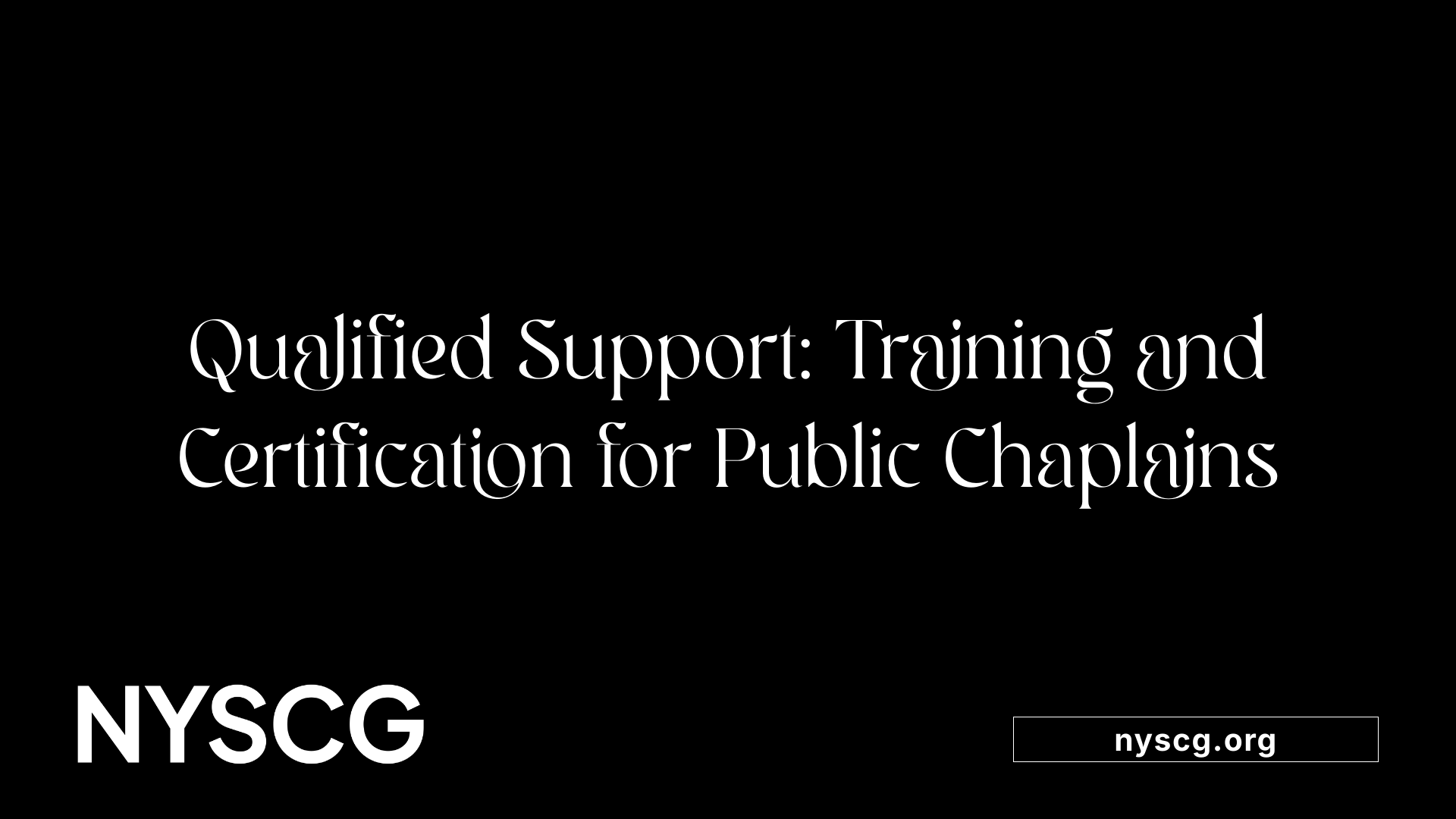
Chaplains serving within public institutions such as law enforcement, military, hospitals, and correctional facilities generally pursue certification through reputable organizations like the Board Certification in Chaplaincy. This certification process involves meeting specific education requirements, including completing a graduate-level degree such as a Master of Divinity or similar from an accredited institution.
In addition to academic qualifications, candidates must complete clinical pastoral education (CPE), which involves supervised practical experience in providing spiritual care. Endorsement by a recognized faith group or religious organization is also required, affirming the chaplain’s standing within their spiritual tradition. Work experience in relevant settings such as hospitals, military, or correctional facilities supports certification eligibility.
Besides the foundational requirements, many chaplains participate in specialized training to address the unique challenges they face in legal or government roles. These include courses on ethics, death notification procedures, crisis intervention techniques, and interfaith dialogue to serve diverse populations more effectively.
While formal, standardized national training requirements do not exist for all nonfederal chaplains, numerous professional development offerings are available. For example, FEMA conducts courses tailored to emergency responders and chaplains involved in disaster response and recovery. Workshops on mental health, trauma, and moral injury help equip chaplains with the skills needed to support officers and community members during high-stress incidents.
Interfaith training has gained importance, emphasizing the ability to serve individuals of varied spiritual backgrounds with sensitivity and competence. Continuous education and credentialing are vital to uphold high standards, adapt to societal changes, and ensure ethical conduct in complex legal and bureaucratic environments.
This ongoing professional development not only enhances the chaplains’ capabilities but also fosters trust and credibility among the populations they serve, ensuring their role remains effective and respected across diverse public settings.
Certification BodyStandards CoveredAdditional Training FocusBoard Certification in ChaplaincyEducation, CPE, endorsement, work experienceEthics, death notification, crisis intervention, interfaith dialogueFEMADisaster response, emergency managementTrauma support, mental health, mass casualty incidentsNASW (National Association of Social Workers)Continuing education on mental health, ethicsStress management, crisis counseling
This layered approach to training and certification ensures chaplains are well-equipped for their vital roles in legal, military, healthcare, and emergency contexts, emphasizing adaptability, cultural competence, and ethical integrity.
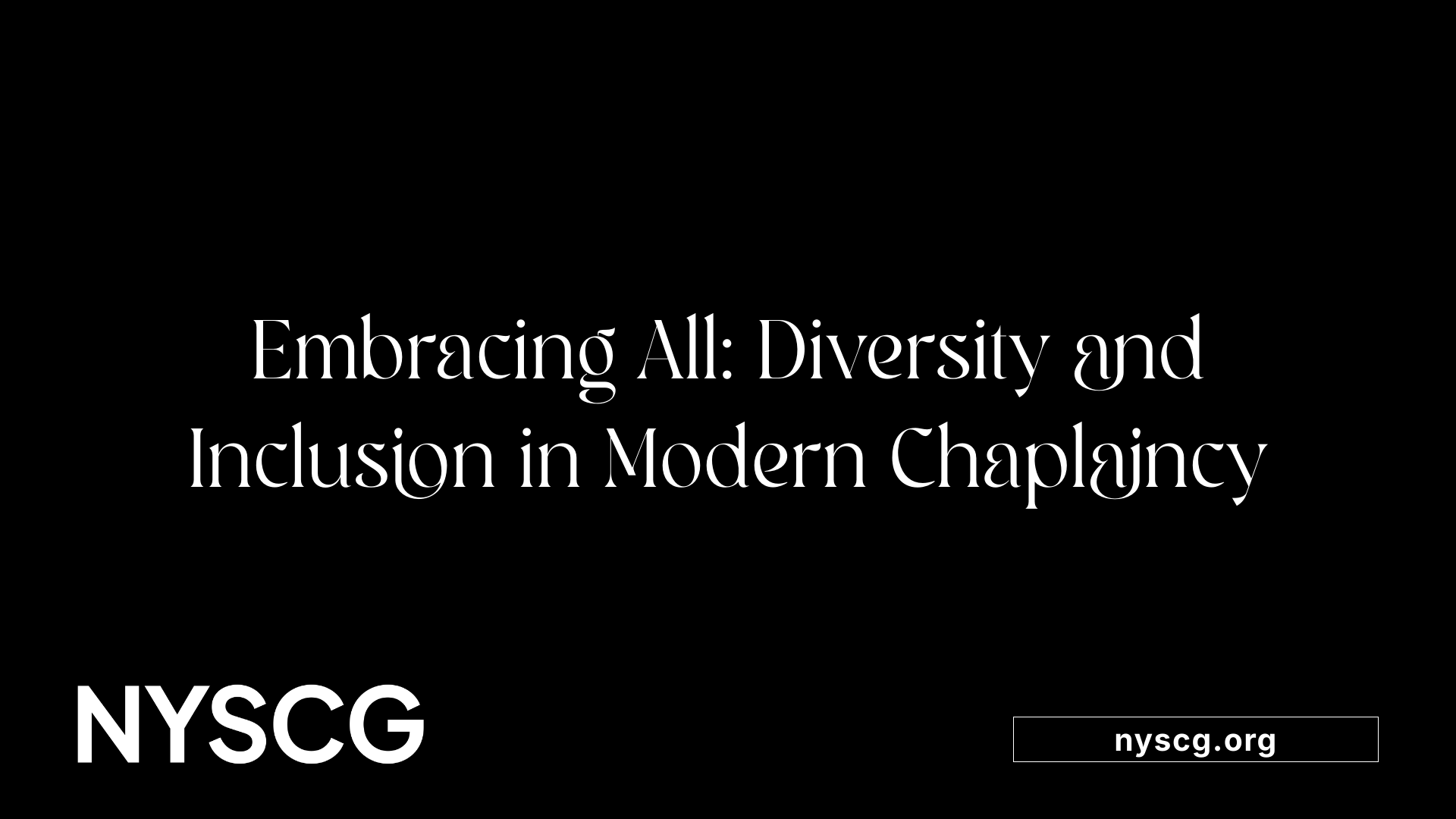
The landscape of chaplaincy is evolving rapidly, driven by increasing cultural and religious diversity within societies. Today, chaplains represent a broad spectrum of faith traditions, philosophical outlooks, and secular worldviews. This includes not only traditional religious practitioners—such as Christian, Jewish, and Islamic chaplains—but also humanist, atheist, and other secular spiritual care providers.
Recognized endorsement organizations, like the Humanist Society, demonstrate the formal acceptance of non-religious perspectives within this field. These organizations set standards for training and certification, requiring chaplains to complete educational requirements similar to their religious counterparts—such as graduate degrees in psychology, philosophy, or theology, as well as clinical pastoral education.
As public institutions like hospitals, military bases, prisons, and universities serve increasingly diverse populations, chaplains are adapting to meet varied needs. They develop inclusive rituals and cultural competency training to ensure respect for different beliefs and worldviews. This inclusive approach makes spiritual care accessible to those who are religiously unaffiliated or who hold complex identities, allowing individuals to express their spiritual or existential concerns in a safe and supportive environment.
The trend towards diversity enhances access to spiritual and emotional support across civic and legal spheres. It fosters a more understanding and respectful society by acknowledging and valifying multiple perspectives. In correctional facilities, hospitals, and community settings, this inclusivity helps bridge gaps, ensuring that all individuals receive appropriate and meaningful chaplaincy care.
This shift also aligns with broader societal changes, reflecting a move towards greater pluralism and recognition of diverse spiritual needs. Consequently, chaplaincy is becoming a more universally accessible and culturally competent profession, capable of serving the complex and varied demographics of contemporary society.
AspectTraditional FocusModern DevelopmentsImpact on SocietyDiversityReligious practitionersInterfaith, secular, humanistIncreased accessibility to support, broader representationEducationReligious trainingMulti-disciplinary, including psychology and ethicsBetter tailored support to varied needsCultural CompetencyBasic religious literacyAdvanced cultural awareness and ritualsRespect and inclusion of diverse identitiesSocietal RoleFaith-based supportInclusive, pluralistic carePromotes understanding among different community groups

Chaplaincy is evolving rapidly in response to societal shifts and technological advancements. One significant trend is the rise of digital chaplaincy, where spiritual support and counseling are delivered via online platforms. This approach increases accessibility, allowing individuals to seek guidance beyond traditional settings like hospitals, prisons, or military bases. Digital services facilitate immediate and widespread reach, especially vital during times of crisis or when face-to-face interactions are limited.
Another influential trend is the growing involvement of chaplains in social justice and environmental advocacy. Many chaplains now participate in community organizing, mobilizing for systemic change, and addressing inequality. They blend spiritual care with activism, helping communities cope with issues such as racial injustice, climate change, and economic disparity. This broader social role aligns spiritual well-being with efforts to promote justice and sustainability.
Societal shifts toward increased cultural diversity have also transformed chaplaincy. As societies become more pluralistic, chaplains are adapting by developing culturally competent and inclusive practices. They serve diverse populations, including those with non-traditional beliefs or no religious affiliation, such as humanists and secular individuals. This expansion reflects the move away from purely religious models towards a more inclusive understanding of spiritual and existential support.
Alongside these developments, declines in traditional religious participation and secularization have prompted chaplains to redefine their roles. They now serve individuals across the spectrum of beliefs, emphasizing compassion, human dignity, and personal growth. The focus has shifted from religious instruction to holistic support addressing mental health, moral dilemmas, and emotional resilience.
These trends demonstrate that modern chaplaincy is a dynamic and adaptable field. Embracing technology, social engagement, and cultural competence allows chaplains to meet contemporary needs effectively. As the societal landscape continues to change, chaplaincy remains vital in providing compassionate, inclusive, and accessible spiritual care in an ever-diversifying world.
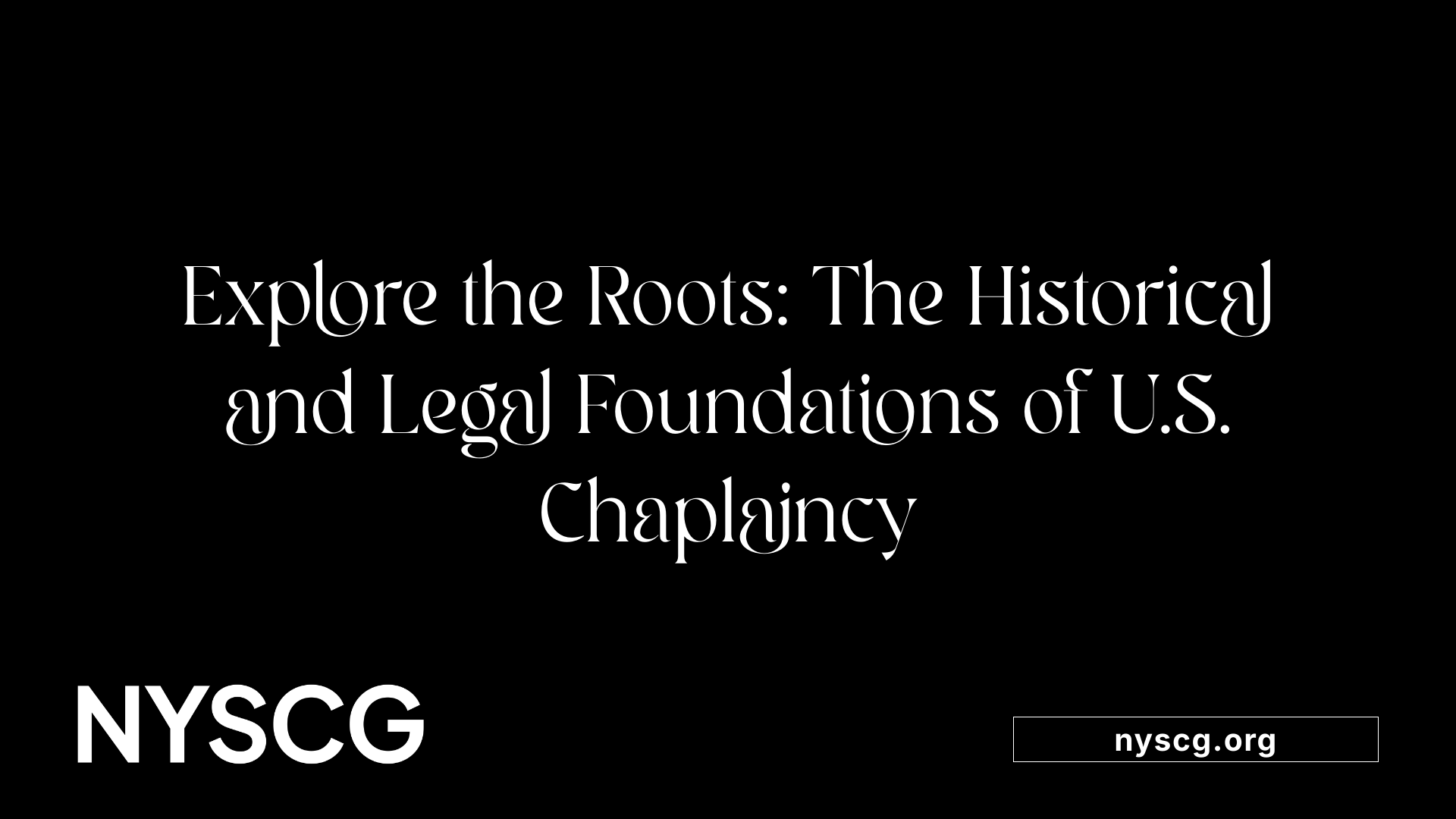
The origins of chaplaincy in the United States trace back to the colonial era, with formal institutional roles expanding significantly in the 18th and 19th centuries. The establishment of official military chaplains in 1775 by the U.S. Continental Congress marked a pivotal moment, creating a dedicated spiritual support system for service members.
By 1789, the federal government expanded the role by mandating chaplains in the U.S. Army, as well as in federal prisons and veterans’ hospitals. This move signaled the formal recognition of chaplains as vital contributors to public service and national defense.
Legal protection for the confidentiality of chaplain communications has been emphasized since the 1960s. Courts, including the U.S. Supreme Court, have affirmed the privilege of confidentiality, recognizing chaplains as trusted advisors akin to legal or medical professionals. This legal backing encourages open and honest dialogue between chaplains and those they serve, ensuring individuals can seek spiritual and emotional support without fear of disclosure.
Throughout the years, the scope of chaplaincy has broadened beyond traditional religious settings. Today, chaplains serve in hospitals, universities, correctional facilities, military bases, and even in secular environments like sports arenas and corporate offices. This diverse range reflects ongoing societal acknowledgment of their importance in supporting spiritual well-being and addressing moral and ethical issues.
The legal framework supporting chaplain services emphasizes the principles of religious freedom, nondiscrimination, and confidentiality. These protections underpin the trust placed in chaplains to serve all individuals, regardless of faith background, and to uphold the integrity of their confidential communications.
In summary, the development of U.S. chaplaincy is deeply intertwined with historical milestones and legal safeguards that protect their role as confidential, trusted facilitators of spiritual and moral support across various sectors. Their evolution reflects society’s commitment to holistic well-being and religious liberty.
For more detailed information, searching with the phrase "Historical development and legal recognition of U.S. chaplaincy" will provide extensive resources on this subject.
The role of chaplains in legal, judicial, and law enforcement settings is rapidly expanding and diversifying, driven by societal changes, a focus on mental health and well-being, and the need for inclusive spiritual support. Their evolving responsibilities include crisis intervention, community engagement, and fostering trust in public institutions, all within a complex web of legal and ethical standards designed to protect individual rights and confidentiality. As the profession becomes more inclusive—embracing interfaith, secular, and culturally diverse perspectives—its societal relevance continues to grow. The legal protections surrounding confidentiality and privilege uphold the integrity and effectiveness of chaplaincy services, underpinning their trusted status in sensitive environments. Moving forward, advanced training, certification, and ongoing professional development will be instrumental in preparing chaplains for this dynamic landscape, ensuring that they meet the needs of increasingly diverse populations. Ultimately, chaplains will play an integral role in shaping resilient, compassionate, and inclusive communities within the justice system and beyond.
All you need is the will to make the world a better place.
New York State chaplain group inc. is a tax deductible organization with a federal tax Id number 92-383-4921